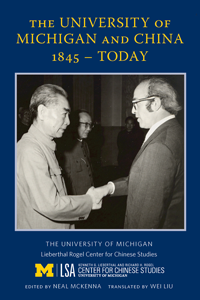
The University of Michigan and China 1845-Today
Skip other details (including permanent urls, DOI, citation information): This work is licensed under a Creative Commons Attribution-NonCommercial-NoDerivatives 3.0 License. Please contact [email protected] to use this work in a way not covered by the license.
For more information, read Michigan Publishing's access and usage policy.
Letter from the President
As the University of Michigan embarks on its third century, it is a natural time to reflect on our past. Our history with China is long and distinguished, starting in 1880 with President James B. Angell’s first visit to the country and, later that century, with the first students from China attending U-M.
With the founding of the Center for Chinese Studies in 1961, the University of Michigan established itself as a premier resource for knowledge of the country and its language, art, culture, and history. We are equally proud of our modern connections, which remain stronger than ever.
Our Kenneth G. Lieberthal and Richard H. Rogel Center for Chinese Studies is home to top scholars, influential projects, and exciting research. It provides students with tremendous opportunities to work with faculty members who are leaders across many academic disciplines. Approximately 2,500 students from China study at U-M at any one time, and exciting academic partnerships are advancing research and education in both of our nations.
My first international trip as president was to China, and I look forward to enhancing our wonderful partnerships with its universities and institutions. I was honored by the warm welcome I received in China, and I was continually impressed by the sizable numbers of U-M alumni I visited in Shanghai, Beijing, and Hong Kong.
The university’s commitment to international education and study abroad experiences for students is clearly well represented in China, with hundreds of Michigan students visiting China each year. We are very committed to supporting students studying abroad and believe that an international experience for students is crucial for advancing cultural competency for graduates who pursue -careers in our increasingly global society.
Thanks to Chinese and U-M educators and researchers working in collaboration, the United States and China have continuing opportunities to learn from each other in many disciplines—and in so doing to strengthen each nation. We can challenge each other, grow and develop together, and help ensure that the people of our nations can have even brighter, more prosperous lives.
MARK SCHLISSEL
President



